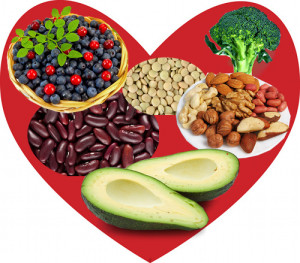Monitoring Heart Health With Diet
 Eating well is the best medicine for a healthy heart, but what does that mean? We all know what unhealthy eating is; too much fast and processed foods, or an unbalanced intake of one thing over another. But what constitutes a heart healthy diet?
Eating well is the best medicine for a healthy heart, but what does that mean? We all know what unhealthy eating is; too much fast and processed foods, or an unbalanced intake of one thing over another. But what constitutes a heart healthy diet?
There are several foods that we all should try to include in our diets on a regular basis to prevent cardiovascular disease. Healthy foods don’t need to be prepared by your local caterer to keep your vascular systems moving. Consuming whole foods and reducing processed foods from your diet is key.
When our arteries and veins are clear to take the blood supply to wherever it needs to go, it does make a huge difference. We are living from a healthy center. Keep in mind also that to reduce your risk of heart disease means you lower your risk for stroke. Include these foods in your diet, get moderate exercise and let Nature do the rest.
Salmon and other cold water fish
Fatty fish, such as salmon, mackerel and sardines are star players on the roster of heart healthy entrees. Each contains omega-3 fatty acids, which when consumed have shown to reduce plaque build-up in arteries as well as even out an irregular heart beat. If you aren’t a fish fan, you can get the omega-3 fatty acids in a supplement, but eating fish twice a week is proven to help keep our hearts swimming right along.
Legumes
While you’re cooking up the salmon steam, roast or saute some beans, or peas. If the mood strikes you, make lentil soup or throw peanuts into your stir-fry. These plant based protein sources have been shown to lower risk of heart disease when eaten four times a week. Legumes in general may help control blood sugar levels and keep your heart clear. Plants with fruit that is contained in a pod is a legume.
Tomatoes
Sticking with veggies for a minute longer, tomatoes are brimming with heart healthy attributes. Any food that helps us eliminate the “bad” cholesterol and keeps our blood vessels running clear is going to have beneficial effects on our heart health. Tomatoes contain the anti-oxidant lycopene which nature designed to help move LDLs out of the way and reduce blockage.
Blueberries
I’m a huge fan of big, fat, sweet organic blueberries. If you prefer to get your berry fix with other berries you’re still on track to giving your heart a cardio boost. Recent studies have indicated that women aged 25 through 42 who enjoyed three or more servings of berries a week lowered their risk of heart attack by 32% in relation to those who ate lesser amounts of berries. Due to the compounds of anti-oxidants and anthocyanins, these delectable little fruits help to dilate blood vessels and thereby lower blood pressure. Berries for breakfast, lunch and dinner!
Extra Virgin Olive Oil
One of the reasons the Mediterranean diet is so well received is because of the use of the constant cooking companion, olive oil. Not only tasty, but heart healthy too, using this oil rich in monounsaturated fats – a good fat. This versatile oil helps reduce cholesterol and lower blood sugar levels.
There are a number of great foods we can include in our daily diets, and these are just a few, but since I can’t close without mentioning my favorite . . .
Dark Chocolate
Now we’re talking! Rich chocolate containing 60% to 70% cocoa content has been found to be of benefit to our cardiovascular system. Of course, like salmon and peas, you must eat a certain amount before it has any effect. How does daily sound? Studies found that daily consumption of dark chocolate, which contains flavonoids called polyphenols help with blood pressure, clotting and inflammation. It has to be the good stuff, though since lower grade chocolate usually found in most candy bars, or milk chocolate won’t do the trick.
A healthy diet can help prevent heart diseases such as a stroke, hence the importance of living a balanced lifestyle with focus on good nutrition. Leave a comment below, or maybe a favorite recipe you would like to share. Monitor your food intake and you monitor your heart.